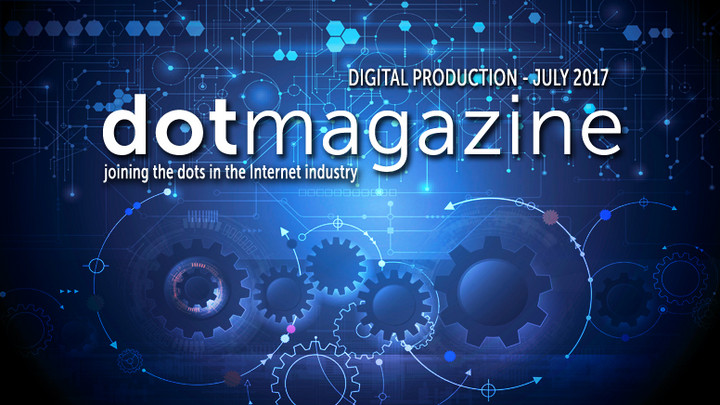doteditorial July 2017
How will the fourth industrial revolution transform business culture and industry? What are the social benefits of industrial IoT? And how can small and medium-sized companies keep up with the pace of change in modern manufacturing? The July 2017 issue of dotmagazine, “Digital Production” explores the brave new world of Industry 4.0 – what’s already happening, how to adapt, how to ensure security, protect intellectual property, and how to succeed using digital production methods.

© Nongkran_ch | iStockphoto & ktsimage | iStockphoto
As a pioneer in industrial IoT, I’ve been privileged to see and also manage some excellent and ground-breaking projects come to fruition. The fourth industrial revolution, as the World Economic Forum has coined it, has already arrived. Anyone active in the Internet and ICT industry knows this. The technology exists, the capabilities are there, the big players in industry have transformed or are transforming themselves. For smaller players around the world right now it is more a problem than a blessing. It’s a question of how to join this race or be swept away by more flexible, more adaptable, and ultimately more efficient competitors.
And for society as a whole, it’s a question of what the human and economic consequences of this revolution may be. While there has been a lot of media attention on the potential for widespread job losses, there has been much less airplay given to the fact that, due to demographic change, there will be much fewer people as a workforce. Moreover new professions are being created. As Marco Comastri points out in his article “2017: The year of automation?”, more than half of today’s school-entry aged children will work in jobs that do not yet exist. And these jobs will probably be more rewarding and more interesting than the average assembly-line work that may soon be a thing of the past.
But why would a company choose to digitally transform its production processes? Well, it’s certainly about optimization – and that can take many forms, from analyzing data to localize problems, undertake predictive maintenance, monitor the state of a machine, optimize systems and avoid wastage, for example. But it’s also about so much more – it’s about transforming your business model, finding new and previously unimagined ways to turn your core business into a forward-looking and sustainable business. And that’s what’s so exciting about this field: there is so much potential to use digital technology to transform any and every production process, from computer modelling for designing and testing products, to the use of robotics in the industries as far apart as automotive and healthcare, to carefully managed micro-climates for optimal wine-growing, and on to additive manufacturing and completely transformed logistics chains.
But taking the first steps in this brave new world can be quite intimidating for small and medium-sized enterprises. Where do you start? How do you start? What infrastructure partners will you need? How can you protect your Intellectual Property? What are the security and legal issues you need to keep in mind? This issue of dotmagazine, “Digital Production”, can offer companies insight into the different phases of digital transformation, and perspectives of Industry 4.0 from a range of sectors within the Internet industry.
In this issue, we follow digital production through from the product design phase, with an interview with Andy Long from Hydro66 on the topic of High-Performance Computing, and on to the production process, with Wolfgang Strasser from @-yet looking at how to secure manufacturing plants and the security of the manufactured IoT products, Klaus M. Brisch and Marco Müller-ter Jung from DWF exploring the use of Public Key Infrastructure for reliably authenticating the IoT devices used in Industry 4.0, and Marco Comastri from CA Technologies looking at end-to-end automation of production processes.
Moving on, Alexander Frese from ITENOS offers advice on the connectivity requirements for digital transformation, Mathias Röckel looks at the use of blockchain along the production value chains for smart contracts, transparency, and the protection of Intellectual Property. Klaus M. Brisch, LL.M. and Marco Müller-ter Jung, LL.M. from DWF go on to explore a particular area of this fourth industrial revolution, 3D printing – which may well completely disrupt some manufacturing and logistic systems that we take for granted today – and the legal questions related to this method. And finally, Mathias Röckel turns the looking glass onto the German industry, showing how German manufacturers use diligence to create a competitive edge, capitalizing on the “Made in Germany” reputation.
Join us in dotmagazine’s exploration of Industry 4.0, and find out how to be a part of the revolution.
Computer scientist Dr. Bettina Horster is Head of Business Development at VIVAI Software AG and is responsible for the area IoT (Internet of Things, Industry 4.0, M2M), and Director of IoT in eco – Association of the Internet Industry. Since 2009 she has been involved with the Internet of Things and is a pioneer in the field. She is currently also project leader for the IoT- EU project “Smart Service Power – technikgestütztes, altersgerechtes Wohnen im Quartier” (for IoT-assisted aged care in the own home), and recently won the UN NGOs Diplomatic Council „Information Society Award“, and was finalist in the UN “World Summit on the Information Society” prize.
Listen to Dr. Bettina Horster's interview on How SMEs Can Approach Digital Transformation.


